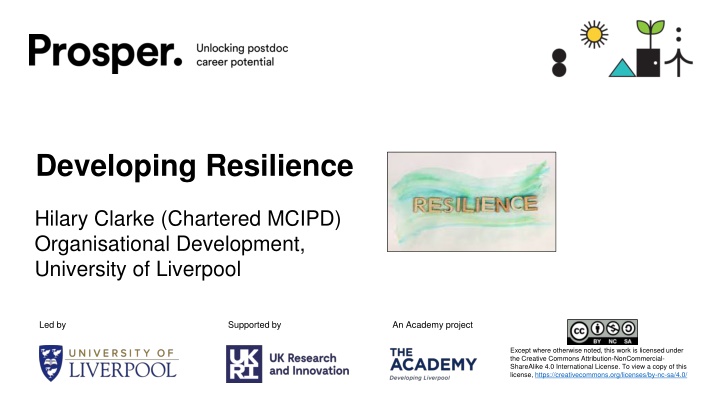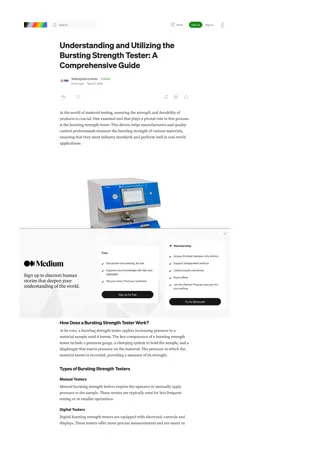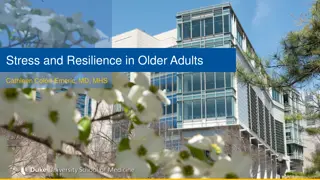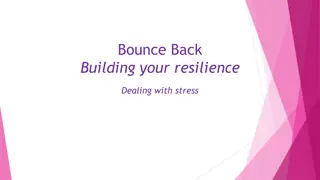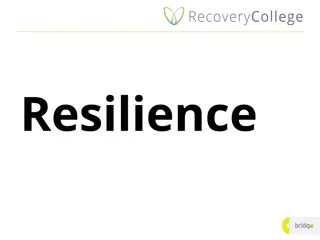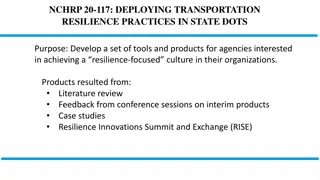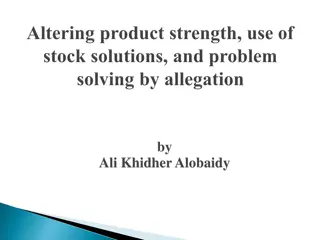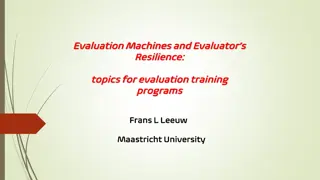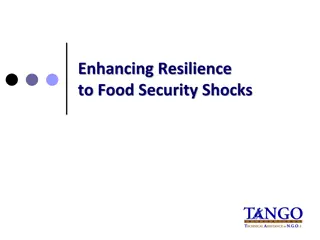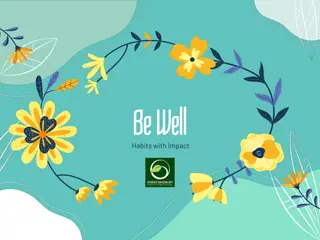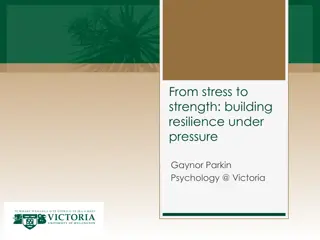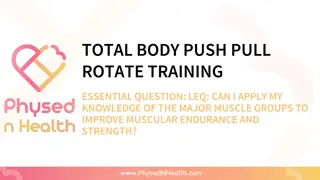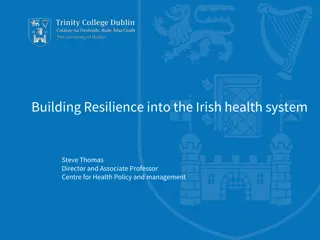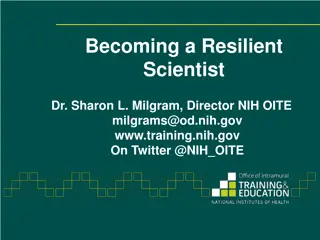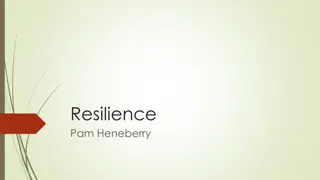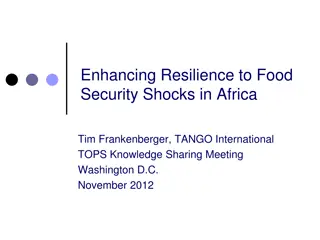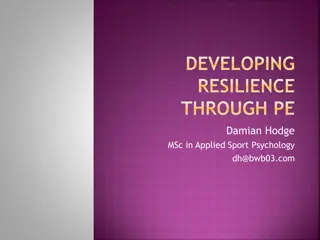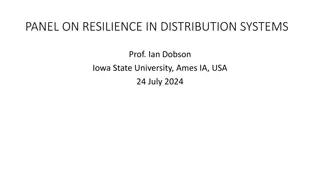Developing Resilience - Key Concepts and Strategies for Building Personal Strength
Understanding resilience is crucial in coping with stress and challenges. Learn from the Robertson Cooper Model about confidence, purposefulness, social support, and adaptability to enhance your ability to bounce back and thrive in difficult situations.
Download Presentation

Please find below an Image/Link to download the presentation.
The content on the website is provided AS IS for your information and personal use only. It may not be sold, licensed, or shared on other websites without obtaining consent from the author.If you encounter any issues during the download, it is possible that the publisher has removed the file from their server.
You are allowed to download the files provided on this website for personal or commercial use, subject to the condition that they are used lawfully. All files are the property of their respective owners.
The content on the website is provided AS IS for your information and personal use only. It may not be sold, licensed, or shared on other websites without obtaining consent from the author.
E N D
Presentation Transcript
Developing Resilience Hilary Clarke (Chartered MCIPD) Organisational Development, University of Liverpool Led by Supported by An Academy project Except where otherwise noted, this work is licensed under the Creative Commons Attribution-NonCommercial- ShareAlike 4.0 International License. To view a copy of this license, https://creativecommons.org/licenses/by-nc-sa/4.0/
Learning Outcomes At the end of this session, you will understand: The Robertson Cooper Model Strategies for resilience Tools and techniques to become more resilient
What is Resilience? "Resilience is the process of managing and adapting positively to significant sources of stress, challenge; It is bouncing back from adversity and growing as a person, even after difficult or traumatic experiences".
BOUNCE-BACK-ABILITY Roger Hargreaves, Mr. Bounce: The Brilliantly Funny Classic Children s illustrated Series
Circle Circle of of Concern Concern & & Circle Circle of of Influence Influence Circle of Circle of Circle of Influence Circle of Influence Concern Concern Proactive Focus Proactive Focus Positive energy enlarges Circle of Influence Reactive Focus Reactive Focus Negative energy reduces Circle of Influence Stephen Covey, The 7 Habits of Highly Effective People
The Robertson Cooper Model The Robertson Cooper Model CONFIDENCE CONFIDENCE Having feelings of competence, effectiveness in coping with stressful situations and strong self-esteem PURPOSEFULNESS PURPOSEFULNESS Having a clear sense of purpose, clear values and direction help individuals to achieve in the face of setbacks SOCIAL SUPPORT SOCIAL SUPPORT Building good relationships with other and seeking support can help individuals overcome adverse situations RESILIENCE ADAPTABILITY ADAPTABILITY Flexibility and adapting to changing situations beyond our control are essential for maintaining resilience Professor Ivan Robertson and Professor Sir Cary Cooper, https://www.robertsoncooper.com/
What steps can you take to deal with Stress and build your own Resilience and wellbeing? 1) 1)Physical Physical Activities Activities (PA) (PA) 3) 3)Emotional Emotional Activities Activities (EA) (EA) keep active be positive and stay hopeful don t keep things to yourself, tell someone about it 2) 2) Relax Relax - - Repairing Repairing Activities Activities (RA) (RA) Connect with people family & friends Listening to music, meditation, sitting outside, sauna try to work out what causes your stress reading, hair cut, facial, etc try to make a plan for the things you can change get enough sleep accept the things you can t change eat well avoid unhealthy habits 4) 4) all all adds addsup upto to a a Healthy HealthyMind Mindand andBody Body
Develop strategies to deal with stress and build resilience Positive Reframing 1. What are the things I'm anxious about today? 2. What one thing I can do to prevent or prepare for it? 3. What's one reason that its probably not going to be as bad as I fear? 4. What's one reason that I can handle this? 5. What's one upside of that situation? 6. Can I see things differently? Is there another way to look at this? 7. Okay, today was a stinker, but it s not the end of the world tomorrow will be a better day STRESS 8. Instead of worrying in an unfocused and unhelpful way about things you have done, ask yourself these questions: what went well? And what have I learnt ? What will I do differently next time?
My Top Tips to help reduce stress and build resilience Taking a lunch break and getting some fresh ai Blocking out time for planning and defining your work and delegating! Refreshing your to do list at the end of the dat Processing your inbox to a manageable amount each day Keeping a success log of your achievements Make sure you re maintaining a life outside of work Avoid getting lost in vague fears. Honestly and realistically, what is the worst that could happen? Let your worry out into the light. Venting for a few minutes can make a big difference. Then LET IT GO! Spend more time in the present moment. Reliving the past in your mind, it s easy to start feeding your worries about the future.
STOP is an acronym that stands for: S: Stop. Whatever you're doing, just pause momentarily. T: Take a breath. Breath normally and naturally and follow your breath coming in and out through your nose. O: Observe your thoughts feelings and emotions. P: Pull back and put things into perspective. Then proceed. Continue doing what you were doing, talk to a friend, rub your shoulders, have a cup of tea. SMILE.
